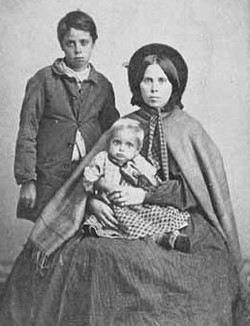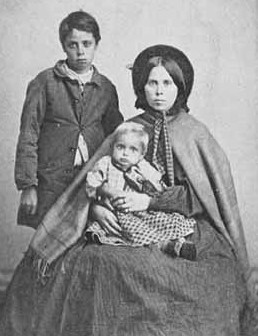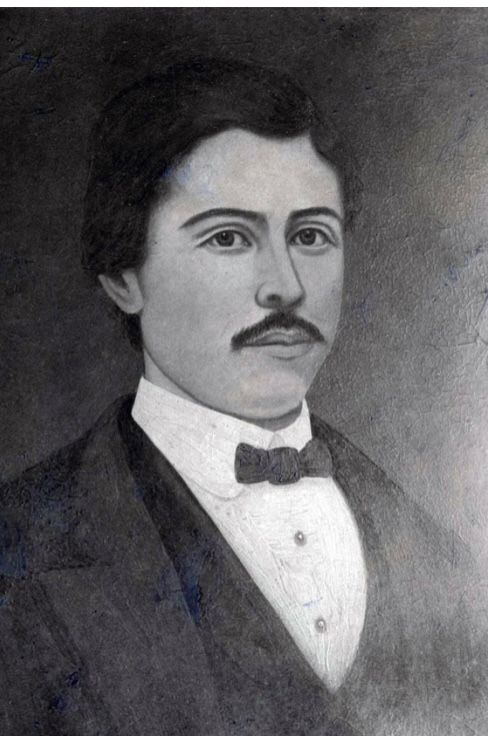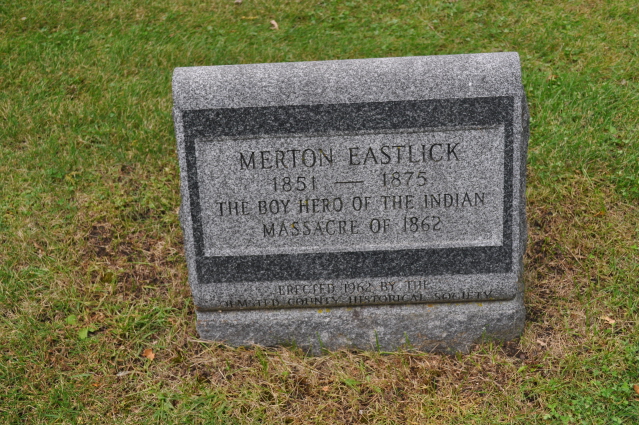He was born in 1851, the son of John Eastlick and Lavina Day, who were both born in 1833. He had four brothers: Frank, Frederick, Giles, and Johnny. The family had moved to Illinois in 1856, but found the price of land too high and moved to Minnesota the following year. By 1861, the family had settled at Lake Shetek in Murray County, Minnesota.
On the morning of Aug. 20, 1862, the settlers isolated at Lake Shetek were unaware that the US-Dakota War (or Sioux Uprising) had erupted three days earlier. Merton's mother was preparing breakfast as usual for her family and Mr. Rhodes, a boarder, when Merton came to the door and said "Charley Hatch is coming, as fast as he can run!" Lavina, thinking someone was hurt, ran to the door and asked Charley, their neighbor, what was the matter. He reported that the Indians were upon them, and "had already shot Voigt", a neighbor. Charley asked for a horse so that he could warn the other settlers.
After giving Charley a horse, the Eastlick family fled to the house of John Wright. When all the settlers arrived at the Wright's house, they decided to flee across the prairie to another settler's house. While on their way, they were overcome by the Indians in a marshy area, which later came to be known as "Slaughter Slough."
Merton's father was killed, along with many other settlers. Lavina hid in the slough with her children. She had gunshot wounds and was told by "Old Pawn", one of the Indians, that she could leave. When she stood up and started to walk away from the area, she was shot in the back. Her sons Frank, Freddy, and Giles, who had tried to follow her, were attacked and killed. Severely wounded, Lavina thrust her baby at Merton and yelled for him to go on as long as he could.
Merton hid in the area and returned to the swamp later that day with his brother. The Indians had left. Five men were still alive; the most severely wounded was the patriarch of the Lake Shetek community, Tommy Ireland. After a few hours of rest, he resolved to try to save the Eastlick boys. He told Merton to carry the baby on his back, and they would try to make it to Charley Hatch's place. However, Ireland could walk no more than several hundred yards when he collapsed. Merton looked at him with tears in his eyes, not knowing how to help him. Ireland told him there was nothing he could do but "keep on and save little Johnny". Merton gathered a pile of leaves and grass and placed them under Ireland's head as a pillow, then kissed him on the cheek. Though he was not a relative, Tommy Ireland was affectionately known as "Uncle Tommy" by the children who lived at Lake Shetek. He gave Merton directions and told him to keep walking until he found someone to take care of them. Merton lifted his 15-month old brother up on his back and started across the prairie.
Over the next several days, he carried his brother for 50 miles. They subsisted on berries and grass. Merton stayed up at night, shouting to the wolves to keep them away while his brother slept. When it rained, he laid his brother on the ground, and bent over him to protect him from the cold rain. By the seventh day, he was weak and emaciated, but still carrying his brother, headed toward New Ulm.
Meanwhile, Merton's mother was also trying to make her way to safety. Over several days, with little food and no protection from the elements, and with severe wounds, she alternatively hid and made her way slowly across the prairie. The thought that her two remaining children could still be alive kept her going. After several days, she was amazed when she saw the mail carrier, August Garzone, on his wagon, traveling his regular route from Sioux Falls to New Ulm. Having been gone a week, he was apparently unaware of the conflict between the Dakota and the white settlers. He was astonished to hear of the attacks. After assessing the extent of Lavina's wounds, he helped her into his sulky and walked along, leading the horse toward New Ulm. Along the way, they stopped at Charley Hatch's place and to their amazement encountered Tommy Ireland, still alive. The next day, after some rest and eating whatever food they could find, they all set out for New Ulm.
The following day, they approached Alomina Hurd and her two children. Alomina told Lavina that Merton was just a short distance ahead, carrying Johnny. Urging the horse along, the group soon came upon them. Merton and his baby brother had been without food for two days. Merton was emaciated and weak. Johnny was unrecognizable, ill with cholera, his face disfigured from being covered with mosquito bites that he had scratched, and his hair pulled out from the back of his head. The flesh was worn off Merton's feet, and he was so weakened and dazed that he was unable to speak for several days. With tears of joy, Lavina thanked God they had been spared, but was unable to rise from the sulky to hug Merton, and could only "press his wasted hand, and call him my dear, brave boy."
The party stopped at Mr. Brown's house. The mail carrier left for New Ulm, but was attacked by Indians. He was able to escape and returned to the Brown's house, did his best for the survivors there, who were now unable to travel, and then left for Sioux Falls, hoping to send soldiers back to rescue them. They scrounged for whatever food they could find over the next few days. Tommy Ireland, despite his wounds, decided he would try to reach New Ulm and send a party back to rescue the others. Defying all obstacles, he successfully reached New Ulm. A rescue party of some soldiers and fellow neighbors who had survived the attack picked up the survivors at the Brown's. On Sep. 5, a group of soldiers escorted the Hurds, Eastlicks, Tommy Ireland, and Mr. Wright from New Ulm to Mankato, where Lavina was finally treated for her wounds.
In 1863, Lavina and her children went to Ohio to stay with her family. During the winter, she documented their account of the Sioux Uprising. From the sale of the book, she was able to to return to Minnesota the following year, and in 1866, bought some land near Mankato. The neighbors helped her build a small frame house. In 1867, Merton built an addition-kitchen, two bedrooms and buttery. Merton learned the trade of carpentry and with that income and what was raised on the farm, the family lived comfortably.
In 1870, Lavina married Solomon Pettibone. Three months later, Solomon visited his sister in Ohio for several days. He left her place to return to Minnesota, but was never heard from or seen again. Lavina's daughter was born in August the following summer. Johnny, now 10 years of age, helped his mother care for the baby and run the household. Neighbors also helped the family.
On Aug. 19, 1873, Merton married Mary Ann Alexander, a native of Rochester, Minn., and daughter of Joseph Alexander. They settled near Rochester. They had one son, Merton William, who was born in Mankato, Minn. on May 23, 1874.
In 1875, Merton died of a pulmonary ailment in Rochester, Minn. He was only 24 years old. His mother gave this account of his death:
Sometime during the summer of 1875 Merton wrote to me telling me that he had taken a severe cold, and had been left with a cough. He wrote several letters afterward, saying that all were well; but a terrible blow awaited me on the 5th of November. I received a telegram from Rochester to "come quick, Merton is dying." Oh! What a shock. I did not faint, but I thought I should die, it was such a shock. I could not speak for some minutes; but tears, blessed tears, came to my relief, and then I seemed to realize the truth that Merton was dying. I thought perhaps I might get to Rochester in time to see him once more if I made all possible haste, and I accordingly went to Mankato that night, and took the train next morning for Rochester. How slow the train moved! It seemed as though I could go faster myself. In my imagination I could see another train that didn't lack for speed. I knew where it would stop and what passenger would go on board. I reached Rochester at one o'clock p.m. Mr. Joseph Alexander Jr., met me at the station. I did not need to ask – I felt that Merton was gone. Mary, my daughter-in-law, met me at the gate, threw her arms around me, kissed me said, "Mother –" She could say no more, and I could say nothing, neither could I shed a tear. They told me that he begged them to do all they could to keep life in him "till mother came," and he told his wife if he could see mother he would be willing to die. He died trusting in Jesus. On Sunday I followed the remains to the grave where kind hands buried the hero of Lake Shetek, my hero, the boy that carried his little brother so far and was the instrument in the hands of God in saving his life. (A Personal Narrative of Indian Massacres, 1862 - by Lavina Eastlick)
(c) Copyright 2009 Cindy Coffin
He was born in 1851, the son of John Eastlick and Lavina Day, who were both born in 1833. He had four brothers: Frank, Frederick, Giles, and Johnny. The family had moved to Illinois in 1856, but found the price of land too high and moved to Minnesota the following year. By 1861, the family had settled at Lake Shetek in Murray County, Minnesota.
On the morning of Aug. 20, 1862, the settlers isolated at Lake Shetek were unaware that the US-Dakota War (or Sioux Uprising) had erupted three days earlier. Merton's mother was preparing breakfast as usual for her family and Mr. Rhodes, a boarder, when Merton came to the door and said "Charley Hatch is coming, as fast as he can run!" Lavina, thinking someone was hurt, ran to the door and asked Charley, their neighbor, what was the matter. He reported that the Indians were upon them, and "had already shot Voigt", a neighbor. Charley asked for a horse so that he could warn the other settlers.
After giving Charley a horse, the Eastlick family fled to the house of John Wright. When all the settlers arrived at the Wright's house, they decided to flee across the prairie to another settler's house. While on their way, they were overcome by the Indians in a marshy area, which later came to be known as "Slaughter Slough."
Merton's father was killed, along with many other settlers. Lavina hid in the slough with her children. She had gunshot wounds and was told by "Old Pawn", one of the Indians, that she could leave. When she stood up and started to walk away from the area, she was shot in the back. Her sons Frank, Freddy, and Giles, who had tried to follow her, were attacked and killed. Severely wounded, Lavina thrust her baby at Merton and yelled for him to go on as long as he could.
Merton hid in the area and returned to the swamp later that day with his brother. The Indians had left. Five men were still alive; the most severely wounded was the patriarch of the Lake Shetek community, Tommy Ireland. After a few hours of rest, he resolved to try to save the Eastlick boys. He told Merton to carry the baby on his back, and they would try to make it to Charley Hatch's place. However, Ireland could walk no more than several hundred yards when he collapsed. Merton looked at him with tears in his eyes, not knowing how to help him. Ireland told him there was nothing he could do but "keep on and save little Johnny". Merton gathered a pile of leaves and grass and placed them under Ireland's head as a pillow, then kissed him on the cheek. Though he was not a relative, Tommy Ireland was affectionately known as "Uncle Tommy" by the children who lived at Lake Shetek. He gave Merton directions and told him to keep walking until he found someone to take care of them. Merton lifted his 15-month old brother up on his back and started across the prairie.
Over the next several days, he carried his brother for 50 miles. They subsisted on berries and grass. Merton stayed up at night, shouting to the wolves to keep them away while his brother slept. When it rained, he laid his brother on the ground, and bent over him to protect him from the cold rain. By the seventh day, he was weak and emaciated, but still carrying his brother, headed toward New Ulm.
Meanwhile, Merton's mother was also trying to make her way to safety. Over several days, with little food and no protection from the elements, and with severe wounds, she alternatively hid and made her way slowly across the prairie. The thought that her two remaining children could still be alive kept her going. After several days, she was amazed when she saw the mail carrier, August Garzone, on his wagon, traveling his regular route from Sioux Falls to New Ulm. Having been gone a week, he was apparently unaware of the conflict between the Dakota and the white settlers. He was astonished to hear of the attacks. After assessing the extent of Lavina's wounds, he helped her into his sulky and walked along, leading the horse toward New Ulm. Along the way, they stopped at Charley Hatch's place and to their amazement encountered Tommy Ireland, still alive. The next day, after some rest and eating whatever food they could find, they all set out for New Ulm.
The following day, they approached Alomina Hurd and her two children. Alomina told Lavina that Merton was just a short distance ahead, carrying Johnny. Urging the horse along, the group soon came upon them. Merton and his baby brother had been without food for two days. Merton was emaciated and weak. Johnny was unrecognizable, ill with cholera, his face disfigured from being covered with mosquito bites that he had scratched, and his hair pulled out from the back of his head. The flesh was worn off Merton's feet, and he was so weakened and dazed that he was unable to speak for several days. With tears of joy, Lavina thanked God they had been spared, but was unable to rise from the sulky to hug Merton, and could only "press his wasted hand, and call him my dear, brave boy."
The party stopped at Mr. Brown's house. The mail carrier left for New Ulm, but was attacked by Indians. He was able to escape and returned to the Brown's house, did his best for the survivors there, who were now unable to travel, and then left for Sioux Falls, hoping to send soldiers back to rescue them. They scrounged for whatever food they could find over the next few days. Tommy Ireland, despite his wounds, decided he would try to reach New Ulm and send a party back to rescue the others. Defying all obstacles, he successfully reached New Ulm. A rescue party of some soldiers and fellow neighbors who had survived the attack picked up the survivors at the Brown's. On Sep. 5, a group of soldiers escorted the Hurds, Eastlicks, Tommy Ireland, and Mr. Wright from New Ulm to Mankato, where Lavina was finally treated for her wounds.
In 1863, Lavina and her children went to Ohio to stay with her family. During the winter, she documented their account of the Sioux Uprising. From the sale of the book, she was able to to return to Minnesota the following year, and in 1866, bought some land near Mankato. The neighbors helped her build a small frame house. In 1867, Merton built an addition-kitchen, two bedrooms and buttery. Merton learned the trade of carpentry and with that income and what was raised on the farm, the family lived comfortably.
In 1870, Lavina married Solomon Pettibone. Three months later, Solomon visited his sister in Ohio for several days. He left her place to return to Minnesota, but was never heard from or seen again. Lavina's daughter was born in August the following summer. Johnny, now 10 years of age, helped his mother care for the baby and run the household. Neighbors also helped the family.
On Aug. 19, 1873, Merton married Mary Ann Alexander, a native of Rochester, Minn., and daughter of Joseph Alexander. They settled near Rochester. They had one son, Merton William, who was born in Mankato, Minn. on May 23, 1874.
In 1875, Merton died of a pulmonary ailment in Rochester, Minn. He was only 24 years old. His mother gave this account of his death:
Sometime during the summer of 1875 Merton wrote to me telling me that he had taken a severe cold, and had been left with a cough. He wrote several letters afterward, saying that all were well; but a terrible blow awaited me on the 5th of November. I received a telegram from Rochester to "come quick, Merton is dying." Oh! What a shock. I did not faint, but I thought I should die, it was such a shock. I could not speak for some minutes; but tears, blessed tears, came to my relief, and then I seemed to realize the truth that Merton was dying. I thought perhaps I might get to Rochester in time to see him once more if I made all possible haste, and I accordingly went to Mankato that night, and took the train next morning for Rochester. How slow the train moved! It seemed as though I could go faster myself. In my imagination I could see another train that didn't lack for speed. I knew where it would stop and what passenger would go on board. I reached Rochester at one o'clock p.m. Mr. Joseph Alexander Jr., met me at the station. I did not need to ask – I felt that Merton was gone. Mary, my daughter-in-law, met me at the gate, threw her arms around me, kissed me said, "Mother –" She could say no more, and I could say nothing, neither could I shed a tear. They told me that he begged them to do all they could to keep life in him "till mother came," and he told his wife if he could see mother he would be willing to die. He died trusting in Jesus. On Sunday I followed the remains to the grave where kind hands buried the hero of Lake Shetek, my hero, the boy that carried his little brother so far and was the instrument in the hands of God in saving his life. (A Personal Narrative of Indian Massacres, 1862 - by Lavina Eastlick)
(c) Copyright 2009 Cindy Coffin












